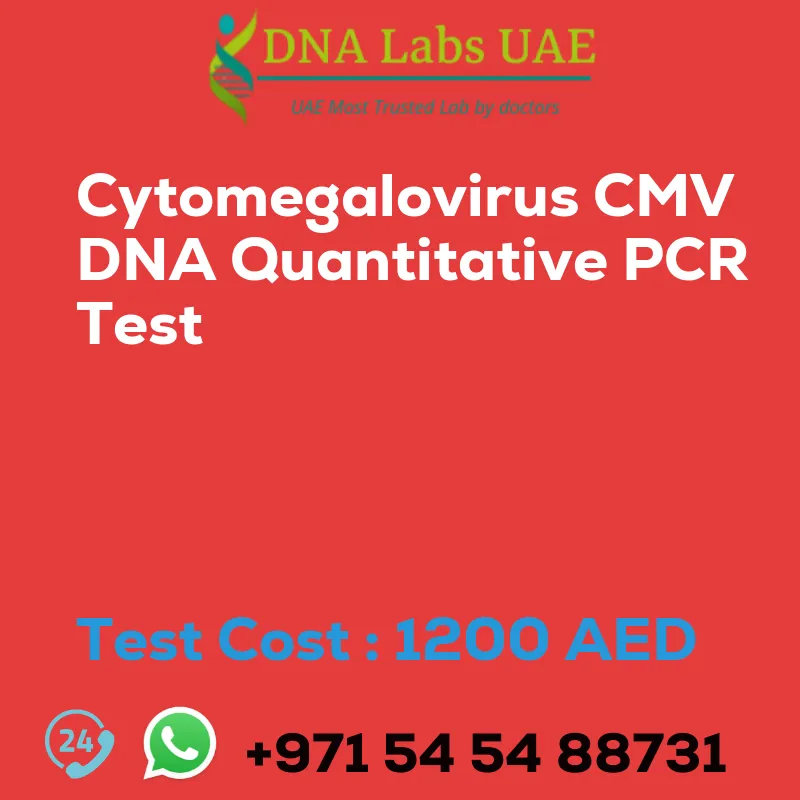CYTOMEGALOVIRUS CMV DNA QUANTITATIVE PCR Test
Cost: AED 1200.0
Introduction
The CYTOMEGALOVIRUS CMV DNA QUANTITATIVE PCR Test is a diagnostic tool offered by DNA Labs UAE. This test is designed to detect and quantify the amount of cytomegalovirus (CMV) DNA in a patient’s blood, tissue, or other bodily fluids. CMV is a common virus that can cause serious illness in individuals with weakened immune systems, such as transplant recipients or those with HIV/AIDS.
Test Components
- Test Name: CYTOMEGALOVIRUS CMV DNA QUANTITATIVE PCR Test
- Price: AED 1200.0
- Sample Condition: 2 mL (1 mL min.) plasma from 1 Lavender Top (EDTA) tube. Separate plasma aseptically within 6 hours of collection. Ship refrigerated or frozen. 12 hours overnight fasting is recommended.
- Report Delivery: Sample Mon through Sat by 3 pm; Report Next day
- Method: Real Time PCR
- Test Type: InfectionsTransplantation Pathology
- Doctor: Surgeon, Nephrologist, Transplant Surgeon
- Test Department: MOLECULAR DIAGNOSTICS
- Pre Test Information: 12 hours overnight fasting is recommended.
Test Details
The CMV DNA quantitative PCR test is a highly sensitive diagnostic tool used to monitor CMV infection in immunocompromised individuals. It involves extracting DNA from the patient’s sample and using a technique called polymerase chain reaction (PCR) to amplify and detect the CMV DNA. This allows for the measurement of the amount of CMV DNA present in the sample, usually reported as the number of CMV DNA copies per milliliter of blood or other fluid.
This test is commonly used in clinical settings to assess the effectiveness of antiviral treatment, determine the risk of CMV disease progression, and guide decisions regarding therapy initiation or adjustment. However, it should be noted that the CMV DNA quantitative PCR test is not a screening test for CMV infection in the general population. It is primarily used in specific clinical situations where CMV infection is suspected or in individuals at high risk for CMV-related complications. The test results should be interpreted in conjunction with the patient’s clinical presentation and other laboratory findings.
| Test Name | CYTOMEGALOVIRUS CMV DNA QUANTITATIVE PCR Test |
|---|---|
| Components | |
| Price | 1200.0 AED |
| Sample Condition | 2 mL (1 mL min.) plasma from 1 Lavender Top ( EDTA) tube. Separate plasma aseptically within 6 hoursof collection.Ship refrigerated or frozen.12 hours overnight fasting is recommended. |
| Report Delivery | Sample Mon through Sat by 3 pm; Report Next day |
| Method | Real Time PCR |
| Test type | InfectionsTransplantation Pathology |
| Doctor | Surgeon, Nephrologist, Transplant Surgeon |
| Test Department: | MOLECULAR DIAGNOSTICS |
| Pre Test Information | 12 hours overnight fasting is recommended. |
| Test Details |
The CMV DNA quantitative PCR test is a diagnostic tool used to detect and quantify the amount of cytomegalovirus (CMV) DNA in a patient’s blood, tissue, or other bodily fluids. CMV is a common virus that can cause serious illness in individuals with weakened immune systems, such as transplant recipients or those with HIV/AIDS. The test involves extracting DNA from the patient’s sample and using a technique called polymerase chain reaction (PCR) to amplify and detect the CMV DNA. The PCR process allows for the amplification of even small amounts of CMV DNA, making it a highly sensitive test. The quantitative aspect of the test refers to the ability to measure the amount of CMV DNA present in the sample. This measurement is usually reported as the number of CMV DNA copies per milliliter of blood or other fluid. The CMV DNA quantitative PCR test is commonly used in clinical settings to monitor CMV infection in immunocompromised individuals. It can help determine the effectiveness of antiviral treatment, assess the risk of CMV disease progression, and guide decisions regarding the initiation or adjustment of therapy. It is important to note that the CMV DNA quantitative PCR test is not a screening test for CMV infection in the general population. It is primarily used in specific clinical situations where CMV infection is suspected or in individuals at high risk for CMV-related complications. The test should be interpreted in conjunction with the patient’s clinical presentation and other laboratory findings. |








